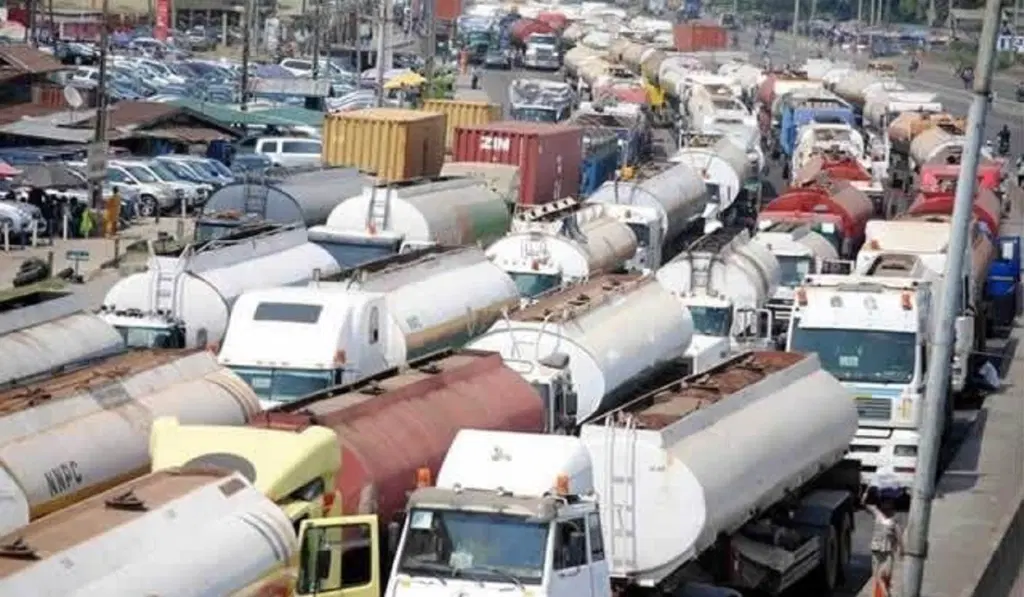FG to bar 60,000-litre fuel tankers from roads March 1
The Nigerian Midstream and Downstream Petroleum Regulatory Authority (NMDPRA) has announced a ban on 60,000-litre fuel tankers from operating on Nigerian roads, effective March 1, 2025, to mitigate truck-in-transit incidents, some of which had resulted in infernos and several deaths. The agency also explained that no truck with over 45,000 litres in capacity will be […]

tankers
The Nigerian Midstream and Downstream Petroleum Regulatory Authority (NMDPRA) has announced a ban on 60,000-litre fuel tankers from operating on Nigerian roads, effective March 1, 2025, to mitigate truck-in-transit incidents, some of which had resulted in infernos and several deaths.
The agency also explained that no truck with over 45,000 litres in capacity will be allowed to load products by the fourth quarter of 2025.
Speaking to journalists on Wednesday in Abuja, Ogbugo Ukoha, NMDPRA Executive Director, Distribution Systems, Storage, and Retailing Infrastructure, said the decision was made in response to the increasing number of road accidents involving heavy-duty petroleum tankers.
He said, “The first stakeholders’ technical committee met today to drill down and put timelines for about 10 resolutions that had been taken on how to drive down the significant increase that had been observed in relation to trucks and transit incidents and fatalities.”
- NIGERIA DAILY: How Tuition Fee Poses Threat To Female Education
- Nigerian farmers have been victimised — Obasanjo
According to him, following deliberations involving key agencies including the Department of State Services (DSS), Federal Fire Service, Federal Road Safety Corps (FRSC), National Association of Road Transport Owners (NARTO), National Union of Petroleum and Natural Gas Workers (NUPENG), Standards Organisation of Nigeria (SON), the Depot and Petroleum Products Marketers Association of Nigeria (DAPPMAN), Nigerian Midstream and Downstream Petroleum Regulatory Authority (NMDPRA), it was agreed that from March 1, 2025, any truck with an axle load of more than 60,000 litres of hydrocarbon will not be allowed to load at any depot.
“The important thing about this is that, for the first time, consensus was built amongst all stakeholders, and we are continuing to encourage that we will work together cohesively to deliver a safe transportation of petroleum products across the country,” he said.
Reacting to the rising number of fatalities, he said, “We noticed in 2023, what we thought was a significant increase in trucks and transit incidents. But in 2024, what we thought was an increase in 2023 was, sadly, much more.
“Last week when we hosted another stakeholders meeting, we even pointed to the fact that the January occurrences are threatening to even exceed or catch up or exceed the 2024. And so, we must draw a line and say, this can no longer continue. There were about 10 interventions that were determined that will mitigate this.”
Compliance will cost tanker owners N300bn – NARTO
Recall that in the wake of the meetings, the National Association of Road Transport Owners (NARTO) had expressed fear over the federal government’s plan to ban 60,000 litres capacity tankers.
NARTO President, Yusuf Othman, in an interview with the News Agency of Nigeria (NAN) in Abuja, said the move would cause a loss of N300 billion worth of investments by the tanker owners.
Othman, however, said the cause of the accidents was not the usage of 60,000 litres tanker capacity but could be attributed to the condition of the roads, the condition of the vehicles and the drivers.
He said that 2,000 trucks with 60,000 litres capacity worth N150 million each, amounting to N300 billion investments were involved in the transportation of petroleum products nationwide.
Othman explained that some of these investments were financed by the commercial banks, while some were personal investments of the tanker owners.
He appealed to the federal government to consider a buy-back policy to help the investors, if it wishes to phase out completely the usage of 60,000 litres tanker capacity in the distribution of petroleum products.
172 oil trucks accidents, 1,896 deaths reported since 2009
The latest oil tanker explosion, which killed nearly 98 people in Niger State, brought attention to the alarming death toll from such incidents since 2009.
A data analysis by Anadolu revealed that these accidents have resulted in approximately 1,896 fatalities over the past 16 years.
Until October 2024, it was 2019 that had the highest number of oil tanker accidents and fatalities, according to a study published in the Nigerian Research Journal of Engineering and Environmental Sciences.
However, a catastrophic explosion on Oct. 15, 2024, in Majia, a town in the Taura Local Government Area, Jigawa State, claimed 181 lives. This incident made 2024 the deadliest year on record, with a total of 266 fatalities.
Between January 2009 and January 2025, Nigeria recorded 172 oil tanker fires and explosions, which caused 1,896 deaths.
The study identified several key factors contributing to these accidents, including individuals collecting spilled fuel, tanker crashes in crowded areas, vehicle collisions, and human errors.
More than 100 incidents were linked to human-related factors, according to research.
Since May 2023, Nigeria has reported 28 oil tanker accidents, resulting in 468 deaths. These incidents account for over 15% of all accidents and nearly 25% of the fatalities recorded since 2009.
